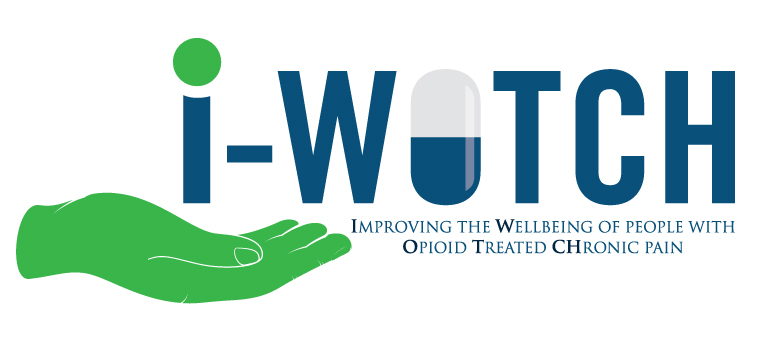Information for health professionals
I-WOTCH: Improving the Wellbeing of People with Opioid Treated Chronic Pain (I-WOTCH)
Hypothesis:
A group multicomponent self-management intervention combined with individual support will improve activities of daily living, for people using strong opioids for persistent non-malignant pain.
Trial summary: Our overarching aim is to conduct a definitive randomised controlled trial to test the effectiveness and cost effectiveness of a multicomponent self-management intervention targeting withdrawal of strong opioids in comparison to best usual care (i.e. the control intervention) for people living with persistent pain. We will run the intervention in three locations (North East England, North East London, and West Midlands). We will recruit 468 participants from around 100 general practices, and from community pain/musculoskeletal services across the three locations.
The I-WOTCH intervention is targeting patients using Buprenorphine, Dipipanone, Morphine, Diamorphine, Fentanyl, Methadone, Oxycodone, Papavertum, Pentazocine, Pethidine, Tapentadol, or Tramadol for the treatment of persistent non-cancer pain. These drugs account for 95 per cent of UK strong opioid prescribing in primary care.
Inclusion Criteria:
-
Aged 18 years old or above
-
Using opioids for chronic non-malignant pain
-
Report using strong opioids for at least three months and on most days in the preceding month
-
Fluent in written and spoken English
-
Willingness for General Practitioner to be informed of participation
Exclusion criteria:
-
Regular use of injected opioid drugs
-
Report chronic headache as the dominant painful disorder
-
Serious mental health problems that preclude participation in a group intervention
-
Using opioids for malignant pain
-
Previous entry or randomisation in the present trial.
- Participation in a clinical trial of an investigational medicinal product in the last 90 days.
The intervention:
The aim of the active arm intervention group is to empower people so that they are better able to make informed choices jointly with their healthcare provider. The active arm intervention includes a three day group course, relaxation CD, mindfulness CD, educational DVD and a copy of “My Opioid Manager” book. This self learning manual is a patient education tool that is the output of a project of Toronto Rehabilitation Institute, University Health Network. Additionally, participants will be offered two one-to-one tapering support appointments with a specially trained I-WOTCH nurse to agree a programme of tapering their opioid dosage, and two follow-up phone calls.
The three-day course is delivered by a trained lay facilitator and a trained nurse facilitator. Using Cognitive Behavioural Therapy techniques and grounded in the biopsychosocial approach to health and illness, it covers acceptance and understanding of tolerance, dependence and addiction, motivation – wanting to change, understanding biological, psychological and social causes of pain, challenging unhelpful thinking and desire to take opioids, reflection, feedback and support.
The control group participants will receive the relaxation CD and “My Opioid Manager” book only.
Outcome measures:
The clinical and cost-effectiveness of the I-WOTCH intervention will be compared to best usual care. Study outcomes include activities of daily living (including engagement with social, cognitive, emotional, physical and recreational activities), pain severity, generic preference based health related quality of life, sleep quality, self-efficacy, compliance/opioid freedom (percentage opioid free at one year, prescribed medication from GP records expressed as defined daily doses; converted morphine equivalents for opioids), adverse events and resource use (using a combination of routinely collected NHS data, such as hospital episode statistics and GP records, and patient self-reported data, such as over the counter medication and other non-pharmacological pain related costs). Follow up data will be collected at four, eight and 12 months.
As well as a within trial economic analysis, we will model the long term impact of the intervention. We will carry out a process evaluation, using the Medical Research Council guidance on developing and evaluating complex interventions including an assessment of intervention fidelity.

Contact:
If you have any questions about the I-WOTCH study, please contact the study team who will be happy to answer them.
Email: IWOTCH at warwick dot ac dot uk
The I-WOTCH study is funded by the National Institute for Health Research, Health Technology Assessment (project number 14/224/04).
